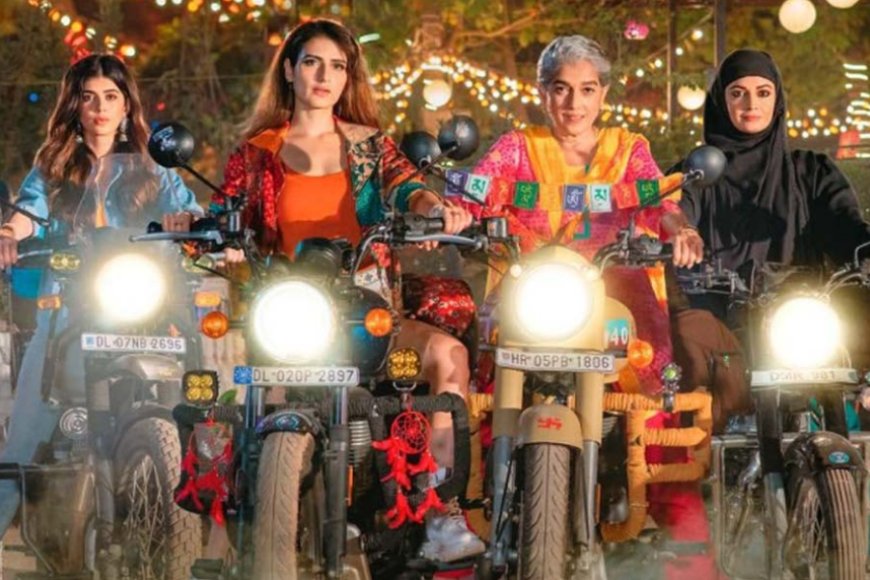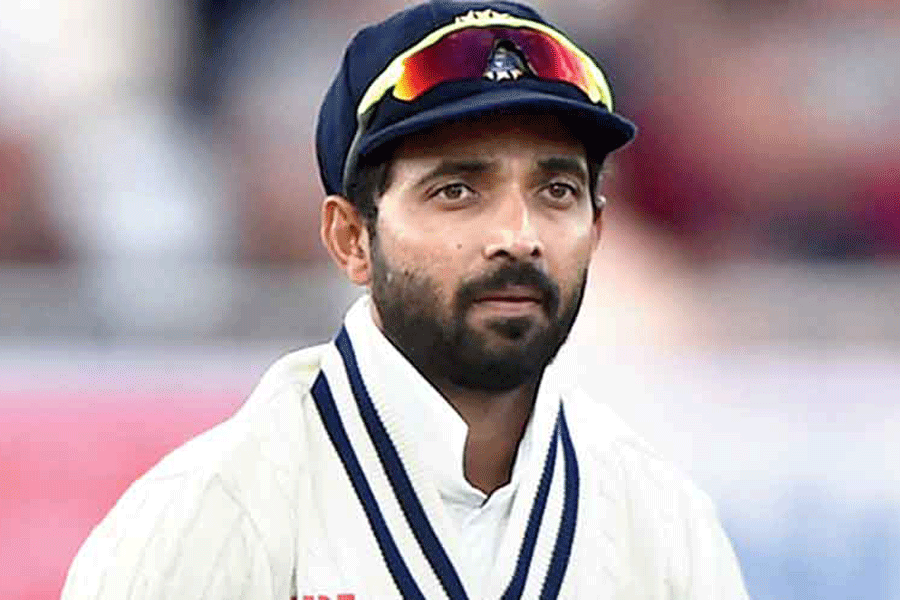Tarun Dudeja Talks About 'Dhak Dhak,' the Journey to Khardung La, and the Importance of Compassionate Storytelling
The Writer-Director Discusses the Challenges of Making a Film with a Strong Female Lead Cast and the Importance of Giving Voice to Everyday Heroes

Before filming his story about four female bikers who band together and zip to the highest motorable pass in the world, writer-director Tarun Dudeja rode his bike to Khardung La. Numerous women have found resonance in Dhak Dhak, which stars Fatima Sana Shaikh, Dia Mirza, Ratna Pathak Shah, and Sanjana Sanghi. This has only strengthened Dudeja's resolve to share more tales of this kind. In a special conversation, Dudeja discusses the difficulties in creating Dhak Dhak and why it has been a really fulfilling experience for him.
How does it feel to have your first major motion picture released in theaters?
Tarun Dudeja: It's an excellent feeling. On social media, people are contacting me to share how the movie moved, inspired, and helped them become more self-aware. A great deal of people would like to travel by car and learn how to ride a bike. It serves as a kind of excellent validation for my desire to tell these kinds of compassionate stories as a storyteller.
What concept led to the creation of Dhak Dhak?
Tarun Dudeja: I'm from Delhi, as is my co-writer Parijat Joshi. Bikers travel to Khardung La by car in large numbers, and it is a significant event for them. Thus, we reasoned that we ought to take action. However, we also asked ourselves, what's so novel about four guys taking a road trip? It's true that we still turn to look at women who ride bikes. Women and motorcycles are not typically associated.
So we reasoned, why not include female motorcyclists in the movie? Road trippers who ride motorcycles are not in short supply. The next challenge was to write about four women who are traveling for different reasons and come from different backgrounds, including different generations and socioeconomic classes. They also don't know one another. There is a very good reason why these women should make the trip, no matter how little it may seem to others.
Have you taken any road trips?
Tarun Dudeja: It's true that we traveled by car from Mumbai to Leh. After driving to Leh, we took bikes to reach Khardung La. That journey advanced our storytelling skills as well. We gained a great deal of life experience. It didn't drastically alter our lives, but as writers and artists, it did alter the way we saw life.
We got to know a lot of female travelers. We learned about the issues they deal with, like the lack of restrooms for female travelers. Furthermore, whatever exists is in poor shape. Thus, whenever they visit a new location, they keep an eye out for potential hidden cameras. These narratives are grounded in research and derived from numerous women's accounts of their experiences.
Dhak Dhak, who came up with the title?
Tarun Dudeja: Everyone enjoyed the symbolic title Dhak Dhak. We discussed a number of titles, but Dhak Dhak stood for both the sound of a bullet (a bike) and the pulse of a heart. Thus, everyone agreed on the decision.
What did you feel was crucial to include in the movie?
Tarun Dudeja: You have to exercise extreme caution as a man when writing about female characters or directing a movie with a strong female lead cast. That being said, I wasn't approaching it from a male or female perspective. I made an effort to approach these characters human-eyed, and I was successful. Although the characters' objectives—such as overthrowing the government or bringing their son back from Pakistan—might not have been overly ambitious, I believe their motivations were just as strong.
Giving her daughter a laptop could be a significant event for someone. Our goal was to make these women seem as commonplace as possible so that others could identify with them and be motivated by them. Naturally, working with such talented actors also means that you get their input, which enriches the character's subtleties.
For what reason did you assign roles to Dia Mirza, Ratna Pathak Shah, Sanjana Sanghi, and Fatima Sana Shaikh?
Tarun Dudeja: As a director, you can tell an actor's perspective on the character when you first meet them. If we're both in agreement, there's an immediate vibe. The ensemble was a dream come true. Individuals all imbibe distinct personalities. Ratnaji, who has a wealth of knowledge and experience, contributed wisdom. I am inspired by Fatima because she is so committed to her work. Dia, ma'am, has a lot of empathy. Manjari benefited greatly from Sanjana's innocence. We had our cast, Manjari (Sanjana Sanghi), Uzma (Dia Mirza), Sky (Fatima Sana Shaikh), and Mahi (Ratna Pathak Shah), I realized in the first meeting itself.
In just 40 days, how did you shoot Dhak Dhak in more than 80 locations?
Tarun Dudeja: Transporting a crew of 200–250 people from Mumbai to Leh was an enormous undertaking. Kudos to my executive producer Anandbrata Ghosh, associate producer Joshua Shirsath, and producer Pranjal Khandhdiya. The weather used to fluctuate greatly. In Delhi, we were filming in 48 degrees Celsius. It was ten degrees Celsius when we arrived in Manali, but it was raining. The temperature used to be zero degrees Celsius at Rohtang Pass and finally dropped to minus two in Leh.
In order to finish the film, it was my responsibility as director to keep the crew motivated despite these hardships. Location shifting is a very challenging process, as anyone who knows anything about filmmaking will attest. We shot for thirty of the forty days, moving to at least two locations each day. How would you shoot at 86 locations if not? To film one scene at the summit and the other at the base of the mountain was an enormous undertaking. The actors were very cooperative as well.
What was it like to film at the highest motorable pass in the world, Khardung La?
Tarun Dudeja: The journey to Khardung La is enchanted. You sense that rise. We managed to capture the vision of eternity from a mountain overlooking the Khardung La board in the movie. Having said that, we shot in less than two hours at a low oxygen altitude of 18,000 feet. Our permission was limited to two hours. Staying there for an extended period of time will damage your lungs because of the low oxygen levels. But with the help of the Army and BRO, we completed it without a hitch. The feeling was one of accomplishment and overwhelm.
Which movies are your favorites for road trips?
Tarun Dudeja: I think Zoya Akhtar's work in India (Zindagi Na Milegi Dobara) is fantastic. Liked Thelma & Louise, too. Not to be forgotten is The Motorcycle Diaries.
Traveling by car can impart life lessons or lead to epiphanies. Have any similar experiences occurred for you?
Dudeja Tarun: Of course, yes. We met migrant workers who construct roads during the research writing road trip. Saying that we are here to ride motorcycles, take in the fresh air, and marvel at the beauty of the mountains is quite simple. However, a man who is constructing a road there doesn't think the mountains are beautiful. I discovered how different people's perspectives and understandings are. My empathy and compassion have increased as a result of that road trip. Seeing how much love and affection people have for one another in tight-knit communities humbled me.
Which led you to pursue a career in writing?
Tarun Dudeja: No one chooses to pursue a career in writing. Actually, it's the love of narrating a story. You love telling stories to people, and you have a story you'd like to share. The reward is something different when you can feel the same emotion in others as you tell the story.
The lonely process of writing and pitching this film and then making it seem like it was worthwhile is evident when people approach me after watching Dhak Dhak and tell me that I told their story and helped them realize what they could do. The urge to tell stories is the only thing that truly inspires me.
What will you create next?
Tarun Dudeja: I wrote the dialogue and screenplay for a film that will be released soon. Vicky Kaushal, Triptii Dimri, and Ammy Virk are the main cast members in this Anand Tiwari film. The arrival date is February 2024. Aside from that, I have two more films that tell the compassionate stories of regular people in extraordinary circumstances. I'm happy to hear that these kinds of stories can exist outside of action and romance.























































